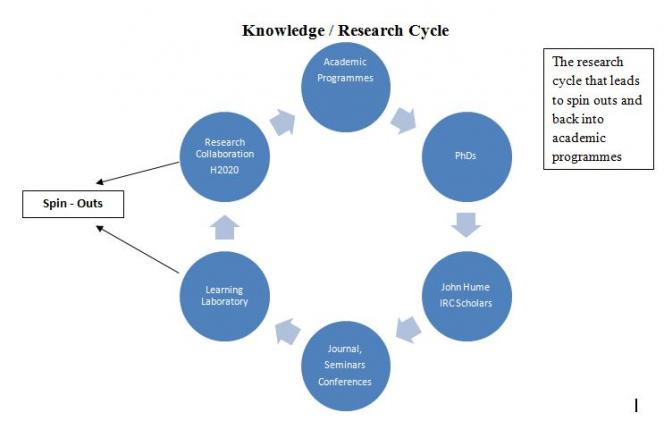Research in the Kennedy Institute
Overview
The institute espouses a strategic approach to Research to encourage and facilitate an applied research agenda within the Kennedy Institute. We identify a number of interlocking constituent features to embed a research culture and nurture new knowledge and re-frame existing knowledge in an applied environment.
1. Introduction
Building on Mason (1996) one could interpret that within an institution, structures, individual actions and cultural ‘texts’ or ‘scripts’ are meaningful components of the social world. Interpreting these different components in our context has influenced the Kennedy Institute to adopt a whole- institute approach to research, using networks rather than traditional concept of committees, integrating it into the entire fabric of the unit.
The Institute adapts this approach because it feels that each component of the unit should fit coherently but gently with each other, providing an emergent rationale for research projects that can be objectively traced from academic programmes to H2020 applications. The ultimate aim of our research agenda is the generation and application of new knowledge and reframing of existing knowledge that impacts on the practitioner community and wider world.
2. The Research Cycle
The scaffolding for research within the institute integrates some traditional research entry points with the development of applied knowledge within community / university partnership ;
· Stage 1 - Research Modules on Academic Programmes leading to;
· Stage 2 - PhD Programmes leading to;
· Stage 3- John Hume / IRC Scholarships leading to;
· Stage 4- Journal Publications / Seminar Presentations / Conferences leading to;
· Stage 5- Learning Laboratory leading to;
· Stage 6 - Collaborative H2020 Applications
Knowledge / Research Cycle
The research cycle that leads to spin outs and back into academic programmes
|
|
3. Learning Laboratory Concept
The Learning Laboratory is our envisaged model for developing innovative mediation practice by practitioners, while stimulating new applied knowledge. Basing on the theoretical conceptions of the dual (double) stimulation (L. Vygotsky) and expansive learning (Y. Engeström) within Activity Theory, it will facilitate incremental improvements in mediation practice. Our intention is to study and adapt the model of the Centre of Activity Theory and Developmental Work Research, University of Helsinki. The idea is to arrange within the Kennedy Institute a learning space in which there is a rich set of instruments for analysing disturbances and for constructing new models for the mediation practice.
4. Learning Laboratory – Operationalising
The Kennedy Institute operates as a hub horizontally across faculties and with external communities across different fields. The Learning Laboratory will be used by a team or work unit or by collaborating partners/ communities across the organisational boundaries, initially with the help of a mediator-academic researcher. The potential of digital tools and spaces in the Learning Laboratory context will be explored, designed and experimented.
5. Conclusion
The Kennedy Institute was established to build capacity for constructive approaches to conflict at all levels in society. We are striving to achieve this by supporting practitioners and policy-makers in building their capacity for constructive conflict intervention while generating new knowledge and leadership that will support communities to transcend predictable patterns of conflict. We identify that this coherent approach to applied research will transform the integration of those mediation and academic communities in the future.
The Kennedy Institute is part of a research project to improve the Effectiveness of Capabilities in EU conflict prevention project launched May 2015
The Kennedy Institute is a member of a consortium of 11 partners from 7 different countries (Finland, Denmark, Slovenia, Ireland, Austria, Netherlands, Belgium). This project has received funding from the EU Framework Programme for Research and Innovation HORIZON 2020 under grant agreement no 653371
IECEU is funded by the EU Framework Programme for Research and Innovation Horizon 2020 and it studies the conflict prevention, crisis management and peacebuilding capabilities of EU. The new project IECEU started in the beginning of May 2015 and will last until end of February 2018 (33 months). IECEU -project aims towards enchancement of European Union (EU) external activities. The consortium is coordinated by Laurea University of Applied Sciences (Finland) and consists of a diverse group of civilian, research and military organisations reflecting the variety within EU missions. The overall goal of the project is to find out new approaches and solutions to respond the future challenges and threats.
The IECEU Consortium consists of multinational team of 11 partners from 7 different countries (Finland, Denmark, Slovenia, Ireland, Austria, Netherlands, Belgium). IECEU is funded by the EU Framework Programme for Research and Innovation Horizon 2020 and it studies the conflict prevention, crisis management and peacebuilding capabilities of EU. The project analyses and evaluates the missions effectiveness in three selected, case study areas, where Common Security and Defence Policy (CSDP) activities are represented: Balkans, Africa, Middle East and Asia. Such comprehensive analysis of current external actions can provide better answers to creating more effective missions.
Through analyses and evaluations the project will identify the best practices and develop new approaches and solutions. In order to achieve the set goals IECEU –project aims to strengthen cooperation between different actors in the operational context. The project looks to provide recommendations for EU to guarantee the long-term stability
Comprising researchers and practitioners drawn from a variety of workplace contexts, the group provides a forum to explore important questions that will inform and support the continued development of workplace mediation in Ireland.
For further information in relation to the Group and its activities, see here
The Kennedy Institute will source potential supervisors and mentors and assist with the application process for those applicants it chooses to endorse.
To identify suitable candidates and to properly support applications, the Institute will need to receive draft applications and resume.



